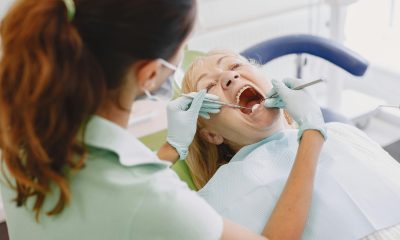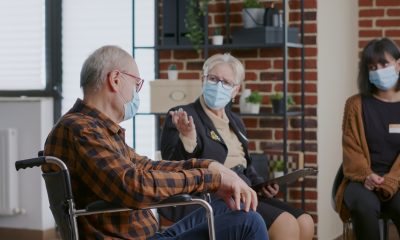News
Home healthcare tech raises $30m to transform elderly care

Birdie has announced $30 million in Series B funding for its home healthcare tech platform which aims to radically improve the lives of millions of elderly people and help them live longer at home.
The latest round takes total investment to $52 million and will be used to accelerate the company’s growth in the UK and further its impact in the European market.
It was led by investment firm Sofina, with OMERS Ventures and follow-on investment from Index Ventures.
The news comes as home care reaches crisis point, with half a million waiting for help in England and carers leaving en masse due to loss of pay.
Ageing at home
Co-founded in 2017 by Max Parmentier, the B-Corp certified company is on a mission to reinvent home healthcare and empower older generations to age confidently in their own homes.
It offers an all-in-one software solution that supports all areas of home care, removing many of the administrative and regulatory burdens placed on care professionals.
Helen, a care professional at Alina Homecare, said: “Previously, we were writing long paragraphs and updates, but now it just takes five minutes to complete each visit note on the app.
“If there is a concern that can’t be actioned during the visit, the office will follow up on the client’s needs right away.
“The best part is that throughout all of this, family members have peace of mind that their loved one is being looked after, as they can track the care being received through the family app.”
In the last year alone, demand for Birdie’s suite of products has increased by three fold as care providers came under enormous pressure to run an efficient care operation with staffing constraints.
The solution helps manage the entire care process; from scheduling visits, creating care plans, preparing audit reports and invoicing to full-service care management, enabling professionals to deliver care safely and efficiently and decreasing time spent on non-critical admin.
Social impact
On the investment, Max Parmentier, co-founder and CEO of Birdie, said: “Our vision has always been to create a world where everyone can age with confidence at home.
“In five years, we have become the operating system for care providers, building the largest home healthcare dataset for the elderly in Europe.
“With millions of clinical data points collected each month, we plan on deriving personalised and predictive insights to enable a value-based healthcare delivery model.
“This latest investment, just over one year from the last round, is not only a validation of Birdie’s growth trajectory, but also an endorsement for the potential of our social impact.”
With a 91 per cent increase in the number of people waiting to receive care across the UK, Birdie is fundamentally transforming the care system, helping care communities identify early points of intervention.
Harold Boël, CEO of Sofina, said: “The home healthcare tech sector seems ripe for an innovative leader like Birdie to catalyse the necessary social change.
“Aligned with our strategy to back growing and sustainable businesses, we’re excited to join them on their mission to enrich the lives of millions of older adults through preventive and personalised care at home.”
Personalised care
A SaaS-based solution at its core, Birdie is aiming to become the technology hub that facilitates information sharing with both health practitioners and care communities for delivering personalised, preventative care at home.
Birdie’s team of over 100 employees currently works with over 700 care businesses, including Alina Homecare, Medacs Healthcare and Care at Home Group, in delivering millions of personalised homecare visits every month.
The platform supports 35,000 care recipients and 8,000 family members who now have access to vital information about their loved ones.
“What really sets Birdie apart is the combination of an intuitive product experience coupled with a true partnership approach to digital transformation,” added Stéphane Kurgan, Venture Partner of Index Ventures.
“We continue to be impressed by the team’s passion, calibre and commitment to social change and are proud to accompany them on their quest to reinvent care for the better.”
News
Medtronic targets US$784m MiniMed IPO

Less than a year after unveiling plans to spin off its diabetes division, Medtronic has confirmed it is seeking to raise US$784 million through an initial public offering of its MiniMed business.
The company intends to offer 28 million ordinary shares at an expected price range of US$25 to US$28 per share.
Underwriters will be granted a 30-day option to purchase up to a further 4.2 million shares at the IPO price.
Once listed, the newly independent company will trade on the Nasdaq under the ticker symbol “MMED”, implying a potential valuation of as much as US$7.86 billion.
Medtronic announced last year that it would separate its US$2.8 billion diabetes unit to create what it described as the only company in the sector to offer a fully integrated insulin management ecosystem.
The business centres on the MiniMed 780G insulin pump, alongside its continuous glucose monitoring systems and smart insulin pen technology.
The diabetes division employs more than 8,000 people and is headquartered in Northridge, California, near Los Angeles.
As the group’s smallest segment by revenue, the spin-off forms part of a wider strategy to streamline Medtronic’s portfolio.
That restructuring has included the formation of kidney care-focused joint venture Mozarc Medical with DaVita in 2023, as well as the company’s exit from the ventilator market the following year.
News
Stem cell therapy improves frailty mobility

A stem cell therapy improved mobility in older adults with age-related frailty after nine months in a phase 2b trial, compared with placebo.
Frailty is a condition in which older people become less able to cope with everyday or sudden stress, leaving them more vulnerable to illness, injury and poor outcomes after surgery.
The study tested laromestrocel, an intravenous therapy derived from donor bone-marrow mesenchymal stem cells.
A total of 148 ambulatory adults with frailty took part, with researchers assessing physical performance and patient-reported outcomes.
Participants receiving the therapy walked further in the six-minute walk test, a standard measure of physical capacity.
After nine months, the treatment group walked an average of 63.4 metres more than those given placebo, a result described as clinically meaningful. At six months, the improvement was 41.3 metres but did not reach statistical significance.
The trial was conducted by Longeveron, a Miami-based clinical stage biotechnology company developing regenerative cell therapies for rare paediatric and chronic age-related conditions.
Joshua M. Hare, chief science officer at Longeveron, said: “We are highly encouraged by these Phase 2b results that demonstrate the potential of stem cell therapy to improve the condition of patients with ageing-related frailty.
“Those with Ageing Frailty are disproportionately compromised in their ability to cope with every day and acute stressors, are at high vulnerability to disease and injury, and are at increased risk for poor outcomes and death after surgery.
“This development area is at the core of Longeveron’s mission advancing stem cell therapies addressing life threatening conditions in the most vulnerable populations children and the elderly.”
Researchers also identified a potential biomarker, meaning a measurable biological indicator, linked to treatment response.
Higher doses of laromestrocel were associated with reductions in soluble TIE-2, a protein involved in blood vessel signalling.
Laromestrocel is being evaluated across several conditions.
The company said the findings point to a possible stem cell therapy approach for managing reduced mobility and other features of age-related frailty.
News
Agetech investment and innovation round-up

Global market to hit US$740bn in 2026, longevity needs lifts? ‘little brain’s’ big role, ageing ethics questioned…and more
IRISH insight and analysis company Research and Markets estimates the global ageing economy will surpass US$740bn this year.
These projections by the company, which is based next to the Guinness Brewery in Dublin, come in its latest paper, entitled: Longevity Market Report 2026-2036.
It takes a holistic view of the ageing economy encompassing consumer wellness, institutional healthcare, technology and regenerative medicine.
In a press release, accompanying the launch Research And Markets, say: “The longevity market is undergoing a structural shift, moving beyond predominantly consumer-driven wellness offerings toward institutionally funded healthcare solutions.
“Insurers, employers, health systems and pharmaceutical companies are increasingly integrating longevity-focused strategies to address the challenges of ageing populations, rising chronic disease burden and long-term cost sustainability.
“This evolution is accelerating demand for integrated platforms that enable early risk identification, targeted prevention and ongoing clinical engagement across the life course.”
Canadian researchers at McGill University say they have found a direct link between age‑related declines in the ‘little brain’ and worsening motor skills.
‘Little brain’ levers
Lead research author Eviatar Fields, a McGill doctoral student in the Integrated Program in Neuroscience, highlights how diminishing neuron activity in the cerebellum – at the base of the skull and known as the little brain – can impact gait, balance and agility.
The research pinpointed how changes in Purkinje cells – a key type of cerebellar neuron – drive this decline and translate into measurable changes in behaviour and physical function.
“By demonstrating how the changes that happen to Purkinje cells in age are causally linked to changes in gait, motor co-ordination and balance, our work provides new avenues for therapies that may prevent or delay motor aging.”
“This provides new hope for extending health span and ultimately improving quality of life and independence in elderly people,” said Mr Fields.
German lift company TK Elevator, is projecting a surge in demand as the global population ages and people find it increasingly difficult to use the stairs.
“As populations age – and that’s happening in Europe, it’s going to happen in China, everywhere else – there’s a need to put in elevators,” said Uday Yadav, its chief executive, speaking to the FT.
Longevity lifts
There are 22 million lifts worldwide, of which 30 per cent are more than 20 years old and potentially ripe to be refitted, he added.
TK Elevator, which was sold by German industrial conglomerate Thyssenkrupp to private equity firms Advent and Cinven for €17.2bn in 2020, is said to be looking at a potential €25bn market listing. Its revenues topped €9bn last year.
Researchers funded by the American Heart Association say the amino acid Taurine increased the life expectancy of mice, and monkeys by up to 25%.
Taurine is one of the most abundant amino acids within our bodies. It is secreted naturally and can be found in foods such as turkey, chicken, shellfish, and dairy.
It has the ability to lower blood pressure, act as an anti-inflammatory agent, and support cardiovascular health, but the concentration within human blood decreases as we age.
As well as longevity, the mice that were fed taurine exhibited improved bone density, muscle mass, pancreas function, and gut health.
Ethical questions
British GP and Medical Director Rammya Mathew has questioned the ethics of longevity highlighting how patients are being charged hefty sums of money ‘for investigations that are often unnecessary, of uncertain benefit, or unsupported by robust evidence’.
She added: “This is framed as empowering patients with knowledge, but it risks crossing the line into over-medicalisation of healthy people.”
The article published in the British Medical Journal continues: “I have watched this field with growing interest, particularly as an increasing number of high profile clinicians, some of whom have held senior roles in the NHS, move into private longevity medicine.
“Practising privately is not unethical in itself. But it does place doctors in an environment where the evidence base is often less clear, commercial pressures are more explicit, and the temptation to conflate innovation with benefit is real.”
Levels of the Nicotinamide Adenine Dinucleotide (NAD+) – a vital coenzyme found in every human cell – are the target of new research by the Nestlé Institute of Health Sciences.
The research published in the Nature Metabolism Journal indicates that certain NAD+ precursors can boost cellular energy levels and influence gut microbiome activity.
The study discovered that NAD+ precursors – nicotinamide riboside (NR), nicotinamide mononucleotide (NMN) increased circulating NAD+ concentrations.
NAD+ levels decline with age in multiple tissues – muscle, liver, brain and skin – by as much 65% from young adulthood to old age.
This contributes to hallmarks of aging like mitochondrial dysfunction, reduced energy production, impaired DNA repair, increased inflammation, and cellular senescence.
Ongoing research has shown that restoring NAD+ (via precursors) improves mitochondrial function, metabolic health, and resilience.

 News3 days ago
News3 days agoInterview: The US company appealing Europe’s rejection of daily Alzheimer’s pill

 Insights4 weeks ago
Insights4 weeks agoInterview: Dr Annu Navani on biotechnology and ‘the power to recode life itself’

 Insights4 weeks ago
Insights4 weeks agoDentordu: Digital dentistry for healthier ageing

 Insights4 weeks ago
Insights4 weeks agoStudy shows clear link between CTE and dementia risk

 News4 weeks ago
News4 weeks agoATW’s research round-up: new Alzheimer trigger identified, UK university targets longevity. fibre not protein?…and more

 News4 weeks ago
News4 weeks agoStudy confirms gut inflammation link to Alzheimer’s

 News4 weeks ago
News4 weeks agoDementia driving hospital discharge delays, new data shows

 News4 weeks ago
News4 weeks agoAssisted dying should be ‘gradually’ extended to dementia, author Ian McEwan says





























